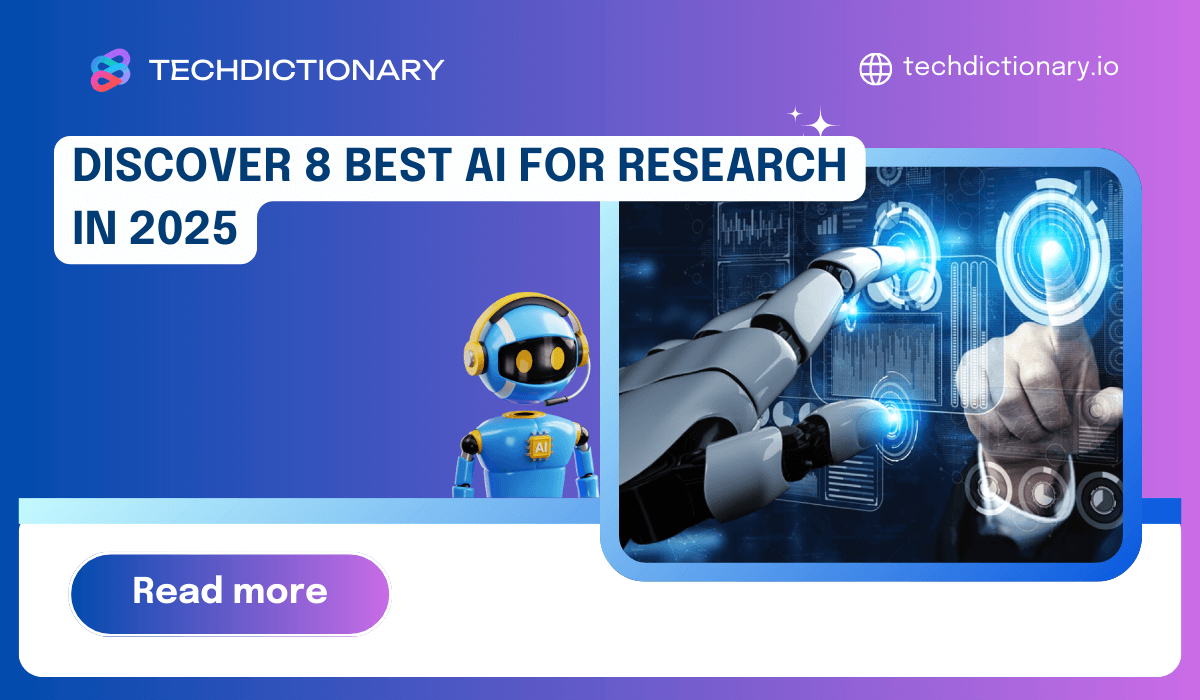Heads up! The article includes affiliate links. If you click and purchase, we may receive an affiliate commission at no extra cost to you. Check our Affiliate Disclaimer.
Research can feel like a never-ending task—sorting through endless papers and data is exhausting.
But what if you had a tool that could scan thousands of sources in seconds, highlight key insights, and even help you write your paper?
That’s where AI for research steps in.
In 2025, AI tools are transforming how academics and researchers work, making the process faster, easier, and more efficient.
In this article, we’ll explore the 8 best AI for research for academics and researchers to help boost your productivity and streamline your research.
8 Best AI for Research for Academics and Researchers in 2025
Julius AI
Julius AI is an AI-powered tool that transforms scientific research by simplifying advanced statistical analysis, supporting diverse data formats (Excel, CSV, PDFs), and generating publication-ready visualizations. It summarizes scientific PDFs to streamline literature reviews, saving researchers time. With a user-friendly interface and strong data privacy, Julius accelerates data-driven discoveries.

Julius AI Homepage
Key features:
- Advanced Statistical Analysis: Performs complex statistical tasks like regression, hypothesis testing, and time-series analysis using reliable libraries (e.g., NumPy, SciPy). Researchers can analyze data accurately without needing programming skills, ideal for scientific studies.
- Scientific Document Summarization: Extracts and summarizes key findings from scientific PDFs, helping researchers quickly understand critical insights. This feature simplifies literature reviews, saving significant time in academic research.
- Professional Data Visualization: Generates high-quality, publication-ready charts (e.g., line, bar, and box plots) from natural language prompts. Visualizations can be downloaded for use in research papers or presentations, enhancing data clarity.
- Multi-Format Data Processing: Supports diverse data formats including Excel, CSV, Google Sheets, PDFs, and images. This allows researchers to seamlessly upload and analyze varied datasets, streamlining research workflows.
Pros & Cons:
| Pros |
Cons
|
| ✅ Easy data analysis, visualization, and animation (Excel, CSV, Google Sheets)
✅ Free plan includes 15 monthly messages
✅ User-friendly interface for non-technical users
✅ Secure data handling with strict access controls
✅ Quick sharing of visualizations with your team
✅ Comprehensive guides and resources for users
✅ Excellent support (chatbot, email, Discord)
✅ Available on iOS and Android |
❌ No real-time support
❌ No API integration
❌ Limited third-party plugin support |
PDF.ai
PDF.ai is an AI-powered tool that revolutionizes scientific research by enabling researchers to chat with PDFs, extracting precise answers with page citations. It offers rapid summarization and multi-document querying, streamlining literature reviews and comparative analysis. Supporting various file formats and languages, PDF.ai ensures accessibility and efficiency for global academic research.

PDF.ai Homepage
Key Features:
- Interactive PDF Chat for Research: PDF.ai allows researchers to chat with PDFs, asking questions and receiving instant answers with page-specific citations. This streamlines the process of extracting key insights from academic papers or reports.
- Rapid Document Summarization: The tool generates concise summaries of lengthy PDFs, helping researchers quickly grasp essential findings. Ideal for literature reviews, it saves time while maintaining accuracy.
- Multi-Document Analysis: Researchers can upload multiple PDFs and query them simultaneously in one conversation. This feature supports comparative analysis across studies, enhancing research efficiency.
- Multi-Format and Language Support: PDF.ai processes PDFs, Word, and PowerPoint files in any language, making it versatile for global research. It ensures accessibility for diverse academic documents.
Pros & Cons:
|
Pros
|
Cons
|
| ✅ Engage in dynamic conversations with PDFs, get answers with page citations
✅ Fast and accurate document summarization for quick insights
✅ Query multiple PDFs simultaneously for comparative analysis
✅ Supports PDFs, Word, and PowerPoint files in all languages |
❌ Free plan limits uploads and questions
❌ Potential for occasional inaccurate responses
❌ No offline functionality |
Consensus
Consensus is an AI-powered research platform that revolutionizes scientific discovery by searching over 200 million peer-reviewed papers to deliver evidence-based insights. It provides researchers with concise study summaries, advanced filters for high-quality papers, and study snapshots, streamlining literature reviews. With quality indicators and precise search capabilities, Consensus enhances efficiency and credibility in academic research.

Consensus AI Homepage
Key Features:
- AI-Powered Academic Search: Consensus searches over 200 million peer-reviewed papers using AI to deliver relevant results with instant insights. Researchers can quickly find evidence-based answers for scientific queries.
- Evidence-Based Summarization: The tool synthesizes key findings from top papers, providing concise summaries with citations. This streamlines literature reviews and helps researchers grasp study outcomes efficiently.
- Advanced Search Filters: Offers filters for study design, sample size, citation count, and methodology, enabling researchers to pinpoint high-quality papers. This ensures precise and reliable research results.
- Study Snapshots and Quality Indicators: Provides detailed snapshots of study attributes (e.g., methods, population, results) and tags like “Highly Cited” or “Rigorous Journal.” These help researchers assess paper credibility quickly.
Pros & Cons:
|
Pros
|
Cons
|
| ✅ Comprehensive search of 200 million peer-reviewed papers for evidence-based results
✅ AI-driven summarization with concise findings and reliable citations
✅ Advanced filters for study design, sample size, and methodology to ensure high-quality papers
✅ User-friendly interface suitable for researchers at all levels |
❌ Free plan limits searches and queries
❌ Limited access to some papers based on availability
❌ Specialized for scientific research, less versatile for broader topics |
Research Rabbit
ResearchRabbit is an AI-powered platform revolutionizing scientific research by enabling researchers to discover and organize academic literature effortlessly. It offers smart paper recommendations, interactive visual maps of citation networks, and collaborative collection management with Zotero integration. By uncovering author connections and streamlining literature reviews, ResearchRabbit enhances research efficiency.

Research Rabbit Homepage
Key Features:
- Smart Literature Discovery: ResearchRabbit’s AI suggests related studies and citation chains from millions of papers via Semantic Scholar. Personalized recommendations refine your literature review efficiently.
- Interactive Visual Network Mapping: Dynamic maps visualize up to 50 papers, showing citation and co-author links with color-coded nodes. This tool simplifies exploring complex research fields.
- Collaborative Collection Management: Organize and share paper collections with notes, syncing with Zotero for easy citations. Assign editing roles to boost team research productivity.
- Author Connection Insights: Uncover influential authors and networks, displaying up to 100 contributors per map. This reveals key interdisciplinary connections in your field.
Pros & Cons:
|
Pros
|
Cons
|
| ✅ AI-driven mapping of paper connections
✅ Helps discover related research and new topics
✅ Free to use for all researchers
✅ Integrates with Zotero for easy reference management
✅ Multiple map views for different research needs
✅ Search for authors and explore their work |
❌ Clunky, less intuitive interface
❌ Steep learning curve
❌ Unclear recommendation algorithm
❌ Relies on external data, limiting scope
❌ Too many suggestions can be overwhelming |
Other AI Research Tools for Academics and Researchers
- Paperguide: Paperguide helps researchers quickly explore and navigate academic papers by offering summaries and insights. It also suggests related papers to enhance literature reviews and broaden research scope.
- Elicit: Elicit is an AI-powered platform that assists researchers in collecting, analyzing, and synthesizing data from academic studies. It helps structure research questions and provides insights for building strong hypotheses.
- Scite.ai: Scite.ai provides AI-driven citation analysis, showing how papers are cited and discussing their impact through “smart citations.” It helps researchers understand how research evolves and is connected across studies.
- Scispace: Scispace is a collaboration-focused AI tool that helps researchers organize and visualize relationships between papers. It enhances team collaboration and simplifies the process of exploring research topics.
Which Factors Should Be Considered When Choosing an AI Tool for Research?
When choosing an AI tool for research, there are several important factors to consider to ensure it meets your specific needs and workflow. Here are some key points to keep in mind:
- Specific Research Needs: Identify whether you need an AI tool for data analysis, literature review, summarization, or citation management. Different tools specialize in different aspects of the research process.
- Integration with Other Tools: Ensure the AI tool integrates well with your existing workflow, such as reference managers (like Zotero) or research databases, to streamline the process.
- Data Privacy and Security: Check if the tool ensures secure data handling, especially when working with sensitive or unpublished research data.
- Cost and Accessibility: Many AI tools offer free plans with limited features. Consider whether the premium version offers enough value for your research needs and whether the tool fits your budget.
- Accuracy and Reliability: Make sure the AI tool is capable of delivering precise and reliable results, especially when analyzing complex datasets or generating research insights.
- Customization Options: Some AI tools allow you to tailor the experience to your specific research field. Check if the tool can be customized to suit your requirements.
- Refund Policy: Look for tools with a clear refund policy, especially if you’re committing to a paid plan. Check if the provider offers a money-back guarantee or a trial period to test the tool’s suitability for your research.
Wrap it up
Choosing the best AI for research is crucial for improving efficiency and the quality of your work. Consider factors like ease of use, integration, data security, and support when selecting the right tool. Don’t forget to review the cost and refund policies to ensure it fits your needs.
With the right AI tool, you can streamline your research process, saving time and enhancing results.
Ready to find the best AI for research? Start exploring today and elevate your research experience!
FAQs
1. Which AI tool is best for research?
The best AI for research depends on your needs. Tools like Julius AI, PDF.ai, and Scite.ai excel in literature review, data analysis, and citation management.






